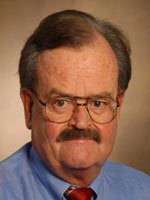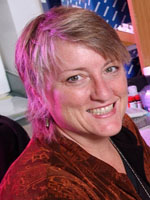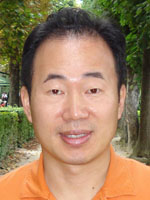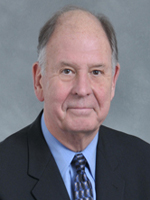The 2015 Scientific Achievement Award winners are listed below.
John Jacob Abel Award in Pharmacology
Pieter C. Dorrestein, PhD
-150x200) Pieter Dorrestein, PhD, an associate professor at the University of California, San Diego, director of the Therapeutic Discovery Mass Spectrometry Center and a co-director of the Institute for Metabolomics Medicine in the Skaggs School of Pharmacy & Pharmaceutical Sciences is the 2015 recipient of the John J. Abel Award in Pharmacology.
Pieter Dorrestein, PhD, an associate professor at the University of California, San Diego, director of the Therapeutic Discovery Mass Spectrometry Center and a co-director of the Institute for Metabolomics Medicine in the Skaggs School of Pharmacy & Pharmaceutical Sciences is the 2015 recipient of the John J. Abel Award in Pharmacology.
The John J. Abel Award in Pharmacology, presented annually, is named after the founder of ASPET. It was established in 1946 to stimulate fundamental research in pharmacology and experimental therapeutics by young investigators.
Dr. Dorrestein was trained by Tadgh Begley in the chemical biology of enzymes involved in vitamin biosynthesis and by Neil Kelleher and Christopher Walsh, who were co-sponsors of his NRSA postdoctoral fellowship, in top and middle down mass spectrometry on proteins that made small molecules of therapeutic value. Since his arrival to UCSD in 2006, Dr. Dorrestein has been pioneering the development of mass spectrometry methods to study the chemical ecological crosstalk between populations of organisms for agricultural, diagnostic and therapeutic applications.
In general Dorrestein thinks about the application of the tools that they develop and new functions of molecules that they discover. In the academic branch of his lab he works on the understanding of the functional roles of specialized molecules and applies this information towards disease intervention such as the evaluation of newly discovered molecules as anti-infective strategies. Many of his tools and methodologies are also impacting industry. For example, the molecular networking tool is being used by industry to discover new pharmacologically related molecules. Molecular networking has led to the first crowd source and social molecular analysis infrastructure at http://gnps.ucsd.edu that is also used by thousands of researchers from over 60 countries. Industry now has jointly developed and implements an assay that monitors inflammatory status and potential of patients and how they respond to therapies using just a small amount of blood. This is being evaluated as a way to stratify patients in clinical trials. Similarly he has a joint project with industry that aims to answer the question of how healthy commensal bacteria alter the immune system.
He has published over 140 articles and is the recipient of several awards, including the Beckman Foundation Young Investigators Award, The National Institutes of Health Exceptional and Unconventional Research Award (EUREKA), the Lilly Award in Analytical Chemistry, the Hearst Foundation Award, the Pharmaceutical Research and Manufacturers of America Award, the Matt Suffness Award and was named a V-Foundation Scholar. In addition he is a technological and research advisor/consultant for INDICASET, Janssen, Agraquest, Bayer, CUBIST, and Sirenas Marine Discovery.
ASPET will present Dr. Dorrestein with the Abel Award on Saturday, March 28, 2015 at 6:00 pm at the Business Meeting and Awards Ceremony at the ASPET Annual Meeting during Experimental Biology 2015 at the Boston Convention & Exhibition Center in Room 107AB. Additionally he will deliver the John J. Abel Lecture on Monday, March 30, 2015 from 8:30 am–9:20 am in the same room.
Julius Axelrod Award in Pharmacology
Jean Rossier, MD, PhD
 Dr. Jean Rossier has been named the recipient of the 2015 Julius Axelrod Award in Pharmacology by the American Society for Pharmacology and Experimental Therapeutics (ASPET).
Dr. Jean Rossier has been named the recipient of the 2015 Julius Axelrod Award in Pharmacology by the American Society for Pharmacology and Experimental Therapeutics (ASPET).
This award was established in 1991 to honor the memory of the eminent American pharmacologist who shaped the fields of neuroscience, drug metabolism, and biochemistry and who served as a mentor for numerous eminent pharmacologists around the world. The Julius Axelrod Award is presented for significant contributions to understanding the biochemical mechanisms underlying the pharmacological actions of drugs and for contributions to mentoring other pharmacologists. ASPET assumed responsibility of the Julius Axelrod Award in Pharmacology from the Catecholamine Club in 2007.
From 1994 to 2012 Dr. Rossier was professor and chairman of the Department of Biology at ESPCI Paris Tech, a famous graduate school where Pierre and Marie Curie discovered radioactivity. Since 2012 he is working at Hôpital Sainte Anne in Paris on translational research on imaging the brain in action.
Dr. Rossier has made several major discoveries in neuropharmacology including his work on neuropeptides with Bloom, Guillemin, and Udenfriend of multiple opioïd peptides delineating several distinct neuronal systems involved in pain and reward. Turning his interests on GABAA receptors, he made the seminal observation that several inverse agonists facilitate performance in learning and memory tasks. This has led to the present development by the pharmaceutical industry of specific inverse agonists which are candidates for promnesic drugs. His most widely technical contribution in neuroscience is the invention of single cell RT-PCR after patch-clamp. This unexpected marriage of molecular biology and physiology led to several discoveries. With single cell RT-PCR, he has deciphered the molecular organization of various synaptic receptors. These key molecules are located at the contacts between neurons. He is now using RT-PCR and a multidisciplinary approach combining electrophysiology, pharmacology and imaging to characterize the diversity of neocortical interneurons and their roles in local blood flow control. This recent discovery of the role played by interneurons in controlling cerebral blood flow has shed light on the physiological mechanisms involved in functional NMR brain imaging, a technique widely used in the study of human brain function.
ASPET will present Dr. Rossier with the Axelrod Award on Saturday, March 28, 2015 at 6:00 pm at the Business Meeting and Awards Ceremony at the ASPET Annual Meeting during Experimental Biology 2015 at the Boston Convention & Exhibition Center in Room 107AB.
Dr. Rossier will present the Axelrod Lecture at the 2016 ASPET Annual Meeting during Experimental Biology in San Diego, California, April 2–6, 2016.
The 2015 Axelrod Lecture will be given by last year’s recipient, Jeffrey L. Benovic of Thomas Jefferson University who will deliver a lecture titled “Arresting Developments in Receptor Signaling” on Sunday, March 29, 2015 from 2:00 pm–2:50 pm in Room 107AB at the Boston Convention & Exhibition Center.
Pharmacia-ASPET Award for Experimental Therapeutics
L. Jackson Roberts, MD
 Dr. L. Jackson Roberts has been named the recipient of the 2015 Pharmacia-ASPET Award for Experimental Therapeutics by the American Society for Pharmacology and Experimental Therapeutics (ASPET).
Dr. L. Jackson Roberts has been named the recipient of the 2015 Pharmacia-ASPET Award for Experimental Therapeutics by the American Society for Pharmacology and Experimental Therapeutics (ASPET).
The Pharmacia-ASPET Award recognizes and stimulates outstanding research in pharmacology and experimental therapeutics, basic laboratory or clinical research that has had, or potentially will have, a major impact on the pharmacological treatment of disease. This award was originally established in 1969 as the ASPET Award for Experimental Therapeutics, but was renamed in 2002, when supported in perpetuity by an endowment from Pharmacia (now Pfizer).
Dr. Roberts is a professor of Pharmacology and Medicine at Vanderbilt University School of Medicine in Nashville, Tennessee. He received his bachelor’s degree from Cornell College in Mt. Vernon, Iowa and his MD degree from the University of Iowa. He did an Internal Medicine residency at Washington University in St. Louis and then moved to Vanderbilt University where he did a postdoctoral fellowship in Clinical Pharmacology, after which he joined the faculty in 1977.
His initial research focus at Vanderbilt was on prostaglandins. However, his discovery, along with Jason Morrow, that prostaglandin-like compounds (isoprostanes) could be formed by a non-enzymatic free radical mechanism in 1990 led him to change his area of research to the field of free radical biology and medicine. His research emphasis is largely translational in nature, taking basic discoveries related to lipid peroxidation and oxidative stress/injury in the laboratory and exploring their role in the pathogenesis of human disease.
ASPET will present Dr. Roberts with the Pharmacia-ASPET Award on Saturday, March 28, 2015 at 6:00 pm at the Business Meeting and Awards Ceremony at the ASPET Annual Meeting during Experimental Biology 2015 at the Boston Convention & Exhibition Center in Room 107AB.
Robert R. Ruffolo Career Achievement Award in Pharmacology
Heidi Hamm, PhD
 Dr. Heidi E. Hamm has been named the recipient of the 2015 Robert R. Ruffolo Career Achievement Award in Pharmacology by the American Society for Pharmacology and Experimental Therapeutics (ASPET).
Dr. Heidi E. Hamm has been named the recipient of the 2015 Robert R. Ruffolo Career Achievement Award in Pharmacology by the American Society for Pharmacology and Experimental Therapeutics (ASPET).
This award was established in 2011 in recognition of the contributions made to drug discovery and development by Dr. Ruffolo. The award recognizes the scientific achievements of scientists who are at the height of their careers and who have made significant contributions to pharmacology.
Dr. Hamm is the Aileen M. Lange and Annie Mary Lyle chair in Cardiovascular Research and professor of Pharmacology at the Vanderbilt University Medical Center. She served as the chair of the Department of Pharmacology at Vanderbilt from 2000–2013 where she oversaw an increase of the size of the department, as well as a quintupling of its funding from the National Institutes of Health (NIH), during her tenure.
Her research focuses on the structure and function of GTP binding proteins and the molecular mechanisms of signal transduction. Her laboratory has been at the forefront of developing our understanding of G protein coupled signal transduction for many years. Early studies in Dr. Hamm’s lab concentrated on visual signaling; she defined sites of rhodopsin interaction with transducin using synthetic peptides from Gα and went on to characterize G protein effector interactions in the same way. She then collaborated with Paul Sigler to determine the three-dimensional structures of heterotrimeric G protein αβγ subunits in their active and inactive conformations and in complex with the Gα subunit. She has extensively used peptides and minigenes encoding small peptides or domains of signaling proteins to define protein-protein interaction and Gα and βγ dependent signaling pathways in cells; minigenes that turn off one G protein pathway at a time in transfected cells showed that receptors that couple to multiple G proteins drive cell-specific responses via non-redundant interactions of multiple G protein pathways. Thus she has pioneered studies of functions of G protein subunits within the context of integrated physiological systems, and is applying mathematical modeling approaches to understand these networks of G protein signaling pathways.
Dr. Hamm has organized a number of meetings including Keystone, the Federation of American Societies for Experimental Biology (FASEB), American Society for Biochemistry & Molecular Biology (ASBMB), and the Gordon Conference on Cyclic Nucleotides and Protein Phosphorylation. She was president of the ASBMB from 2006–2008. Dr. Hamm has served on the NIH Visual Sciences C study section, the NIH Reviewers Reserve, the Board of Scientific Counselors, NHLBI, and the NIH Peer Review Advisory Committee; she currently sits on the CSR Advisory Committee. She is on the Board of Directors, Keystone Symposia on Molecular and Cellular Biology. She has served on the Editorial Boards of The Journal of Biological Chemistry, Biochemistry, Molecular Pharmacology, and Investigative Ophthalmology and Visual Science. She is currently a member of the Editorial Board of The Journal Chemical Biology & Drug Design. She holds the Earl W. Sutherland, Jr. Endowed Chair of Pharmacology at Vanderbilt University Medical Center.
ASPET will present Dr. Hamm with the Ruffolo Award on Saturday, March 28, 2015 at 6:00 pm at the Business Meeting and Awards Ceremony at the ASPET Annual Meeting during Experimental Biology 2015 at the Boston Convention & Exhibition Center in Room 107AB.
David Lehr Research Award
Doo-Sup Choi, PhD
 Dr. Doo-Sup Choi has been named the recipient of the first David Lehr Research Award by the American Society for Pharmacology and Experimental Therapeutics (ASPET).
Dr. Doo-Sup Choi has been named the recipient of the first David Lehr Research Award by the American Society for Pharmacology and Experimental Therapeutics (ASPET).
The Lehr Award is intended to extend funding for preclinical or clinical research directed towards improving human health. This award is made possible by an endowment to ASPET from Mrs. Lisa Lehr in honor of her husband, the late Dr. David Lehr, former chair of the Department of Pharmacology for New York Medical College.
Dr. Choi is professor of Pharmacology and Psychiatry at the Mayo Clinic College of Medicine. He serves as the director of the Samuel C. Johnson Genomics of Addiction Program at Mayo Clinic. He received his bachelor’s and master’s degrees in Biochemistry at Yonsei University in Korea. He went on to receive a PhD in Cellular and Molecular Biology at Universitée L. Pasteur, IGBMC in Strasbourg, France. His postdoctoral fellowship in Neurobiology of Addiction was completed in the Department of Biopharmaceutical Sciences at the University of California, San Francisco.
He is a member of the Neurotoxicology and Alcohol study section of the National Institutes of Health (2012–2016). He is on the editorial board of Addiction Genetics (2012–present), Journal of Addictive Behaviors Therapy & Rehabilitation (2012–present), Journal of Medical Research and Practice (2011–present), and PLOS ONE (2011–present). He received a Young Investigator Travel Award from the International Behavioural and Neural Genetics Society (IBANGS) in 2009 and the Outstanding Young Investigator Award from IBANGS in 2005.
Dr. Choi has extensive experience in molecular and neuropharmacology of alcohol use disorders (AUD) and psychiatric disorders. He has published more than 70 peer-reviewed articles including many high impact papers in journals such as Nature Neuroscience, Journal of Clinical Investigation, Molecular Psychiatry, PNAS, Biological Psychiatry, Development, Journal of Neuroscience, and Neuropsychopharmacology.
He will use the award to research Adenosine-Mediated Glutamate Signaling in Neuro-Glial Interaction and Alcoholism. The purpose will be to study molecular mechanisms of adenosine-regulated glutamate signaling, which is an essential component of the medial prefrontal cortex (mPFC)-striatal circuit and ethanol seeking behaviors.
ASPET will present Dr. Choi with the Lehr Award on Saturday, March 28, 2015 at 6:00 pm at the Business Meeting and Awards Ceremony at the ASPET Annual Meeting during Experimental Biology 2015 at the Boston Convention & Exhibition Center in Room 107AB.
Reynold Spector Award in Clinical Pharmacology
Scott A. Waldman, MD, PhD, FCP, FAHA
 Dr. Scott A. Waldman has been named the first recipient of the Reynold Spector Award in Clinical Pharmacology by the American Society for Pharmacology and Experimental Therapeutics (ASPET).
Dr. Scott A. Waldman has been named the first recipient of the Reynold Spector Award in Clinical Pharmacology by the American Society for Pharmacology and Experimental Therapeutics (ASPET).
This award was established in 2014 by ASPET in recognition of Dr. Spector’s dedication and contributions to clinical pharmacology. The award recognizes excellence in research and/or teaching in clinical pharmacology. It is made possible by an endowment to ASPET from Dr. Reynold and Mrs. Michiko Spector.
Dr. Waldman obtained his PhD from Thomas Jefferson University, and his MD from Stanford University. He was a postdoctoral fellow at the University of Virginia and Stanford University in the Division of Clinical Pharmacology in the laboratory of Ferid Murad, MD, PhD (Nobel 1998).
He currently holds the endowed chair as Samuel MV Hamilton Professor of Medicine, and is director of the Delaware Valley Institute for Clinical and Translational Research, director of the Gastrointestinal Cancer Program of the Kimmel Cancer Center, director of the Institute for Individualized Medicine, and chairman of the Department of Pharmacology and Experimental Therapeutics of Thomas Jefferson University.
Dr. Waldman also directs the MD-PhD Program, the National Institutes of Health (NIH) sponsored Postdoctoral Training Program in Clinical Pharmacology, and the Training Program in Human Investigation (former NIH K30 Program) at Jefferson. He is a past member of the American Board of Clinical Pharmacology, a past Regent of the American College of Clinical Pharmacology (ACCP), a past-president of ASPET, and chair of the Scientific Program Committee and council member of ASPET. He is a Fellow of the ACCP (FCP) and American Heart Association (FAHA). He is the editor-in-chief for Clinical Pharmacology and Therapeutics and Biomarkers in Medicine, the deputy editor-in-Chief for Clinical and Translational Science and co-editor for Waldman and Terzic’s Pharmacology and Therapeutics: Principles to Practice. Dr. Waldman’s research interests focus on clinical pharmacology and translational medicine in the context of gastrointestinal malignancies and obesity.
ASPET will present Dr. Waldman with the Spector Award on Saturday, March 28, 2015 at 6:00 pm at the Business Meeting and Awards Ceremony at the ASPET Annual Meeting during Experimental Biology 2015 at the Boston Convention & Exhibition Center in Room 107AB.
Dr. Waldman will present the Spector Lecture titled "Bench-to-Bedside Translation in Clinical Pharmacology: From Knowledge Generation to Healthcare Delivery" on Tuesday, March 31 from 8:30 am–9:20 am in Room 107C of the Boston Convention & Exhibition Center.
Torald Sollmann Award in Pharmacology
James E. Barrett, PhD
 Dr. James E. Barrett has been named the recipient of the 2015 Torald Sollmann Award in Pharmacology by the American Society for Pharmacology and Experimental Therapeutics (ASPET).
Dr. James E. Barrett has been named the recipient of the 2015 Torald Sollmann Award in Pharmacology by the American Society for Pharmacology and Experimental Therapeutics (ASPET).
This award was established in 1960 to commemorate the pioneer work of Dr. Torald Sollmann in the fields of pharmacological investigation and education. The award is presented biennially for significant contributions over many years to the advancement and extension of knowledge in the field of pharmacology.
Dr. Barrett is professor and chair of the Department of Pharmacology and Physiology and founding director of the Drug Discovery and Development Program at Drexel University College of Medicine and of the Clinical and Translational Research Institute, Drexel University. He received his PhD from Pennsylvania State University followed by postdoctoral training in neuropsychopharmacology at the Worcester Foundation for Experimental Biology.
He has served on the faculty at the University of Maryland and at the Uniformed Services University of the Health Sciences (USUHS) where he was Professor in the Departments of Psychiatry, Pharmacology and Medical Psychology. Dr. Barrett joined Wyeth as vice president of Neuroscience Discovery Research following the merger with Lederle Laboratories where he had been director of Central Nervous System Research. Prior to his current position at Drexel University College of Medicine, he was senior vice president, chief scientific officer, and president of Research at Adolor Corporation, a company focused on pain pharmaceuticals. He moved to Adolor after serving as president of Research and Development at Memory Pharmaceuticals, a biopharmaceutical company dedicated to the development of drugs for the treatment of debilitating central nervous system (CNS) disorders.
He has published more than 275 scientific articles, books and abstracts in the areas of neuropharmacology, neurobiology, behavioral pharmacology, translational research and neuroscience and serves on several editorial boards. He has served as president of the Behavioral Pharmacology Society and of ASPET. He served as the chair of the Board of Publication Trustees for ASPET and has served on the Board of Directors for the Federation of American Societies for Experimental Biology (FASEB), where he was a member of the Science Policy Committee and the Public Affairs Committee as well as chair of the “Breakthrough Series in Science” and “Horizons in Bioscience” Series. Dr. Barrett recently joined the Board as series editor for the Handbook of Experimental Pharmacology. He has received the Solvay-Duphar Award for Research on Affective Disorders, the George B. Koelle Award from the Mid-Atlantic Pharmacology Society for contributions to teaching and research and, most recently, the P.B. Dews Lifetime Achievement Award for Research in Behavioral Pharmacology. Dr. Barrett is currently a member of the External Scientific Advisory Board, Preclinical Autism Consortium for Therapeutics. He is also the president of the Association of Medical School Pharmacology Chairs and was recently elected to the Executive Committee of the International Union of Basic and Clinical Pharmacology. His current research emphasis is in the area of pain, its comorbid pathologies, and on basic mechanisms and new therapeutics.
ASPET will present Dr. Barrett the Sollmann Award on Saturday, March 28, 2015 at 6:00 pm at the Business Meeting and Awards Ceremony at the ASPET Annual Meeting during Experimental Biology 2015 at the Boston Convention & Exhibition Center in Room 107AB.
Division for Drug Metabolism Early Career Achievement Award
Namandjé N. Bumpus, PhD
 Dr. Namandjé N. Bumpus has been named the recipient of the 2015 Division for Drug Metabolism Early Career Achievement Award by the American Society for Pharmacology and Experimental Therapeutics (ASPET).
Dr. Namandjé N. Bumpus has been named the recipient of the 2015 Division for Drug Metabolism Early Career Achievement Award by the American Society for Pharmacology and Experimental Therapeutics (ASPET).
This award is presented biennially and was established to recognize excellent original research by early career investigators in the area of drug metabolism and disposition.
Dr. Bumpus received a PhD in pharmacology from the University of Michigan and performed thesis research in the laboratory of Dr. Paul F. Hollenberg where she investigated the effect of a naturally occurring cytochrome P450 (CYP) 2B6 mutation on the ability of the enzyme to become inactivated by known inactivators of the wild-type enzyme.
As a postdoctoral fellow with Dr. Eric F. Johnson at The Scripps Research Institute, Dr. Bumpus studied the regulation of CYP4A and CYP4F genes in mice. She is currently an assistant professor in the Department of Pharmacology & Molecular Sciences and the Department of Medicine – Division on Clinical Pharmacology at The Johns Hopkins University School of Medicine. Her research program is focused on defining the contribution of drug metabolism to the pharmacology and toxicology of drugs used to treat and prevent HIV infection. She serves on the Drug Metabolism and Disposition editorial board and is a regular member of the National Institutes of Health (NIH) Xenobiotic and Nutrient Disposition and Action study section.
Dr. Bumpus will present the Drug Metabolism Early Career Achievement Award Lecture at the ASPET Annual Meeting during Experimental Biology 2015 in Boston, Massachusetts. This lecture will take place on Monday, March 30 from 2:00 pm–2:50 pm in Room 109A at the Boston Convention & Exhibition Center. The award will also be presented at that time.